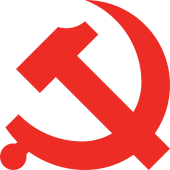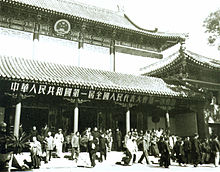Politburo of the Chinese Communist Party
Central Political Bureau of the Communist Party of China 中国共产党中央政治局 | |
|---|---|
 | |
| Leadership | |
Status | |
Leader of the Party | |
1st-ranked member | Xi Jinping |
Elected by | the Central Committee |
Responsible to | the Central Committee |
| Seats | 25 |
| Meeting place | |
 | |
| Huairen Hall, Zhongnanhai Beijing, China[1] | |
| Politburo of the Chinese Communist Party | |||||||
|---|---|---|---|---|---|---|---|
| Simplified Chinese | 中国共产党中央政治局 | ||||||
| Traditional Chinese | 中國共產黨中央政治局 | ||||||
| Literal meaning | China Communist Party Central Political Bureau | ||||||
| |||||||
| Politburo | |||||||
| Chinese | 政治局 | ||||||
| Literal meaning | Political Bureau | ||||||
| |||||||
Politics of China |
|---|
 |
|
- For the USSR body, see Politburo of the Communist Party of the Soviet Union.
The Politburo of the Chinese Communist Party, formally known as the Central Political Bureau of the Communist Party of China and known as the Central Bureau before 1927, is the decision-making body of the Chinese Communist Party (CCP). Currently, it is a group of 25 top officials who oversee the CCP. Unlike politburos of other Communist parties, power within the Chinese politburo is further centralized in the Politburo Standing Committee, a group of 7 individuals from among the 25 top officials.
The Politburo is nominally elected by the Central Committee. In practice, however, scholars of Chinese elite politics believe that the Politburo is a self-perpetuating body, with new members of both the Politburo and its Standing Committee chosen through a series of deliberations by current Politburo members and retired Politburo Standing Committee members. The current and former Politburo members conduct a series of informal straw polls to determine the group's level of support for each new candidate's membership in the Politburo. The process for selecting the new Politburo begins with a closed door meeting by the incumbent Politburo Standing Committee in Beidaihe in the summer before the National Congress of the CCP convenes.[2][3]
The power of the Politburo resides largely in the fact that its members generally simultaneously hold positions within the People's Republic of China state positions and with the control over personnel appointments that the Politburo and Secretariat have. In addition, some Politburo members hold powerful regional positions. How the Politburo works internally is unclear, but it appears that the full Politburo meets once a month and the standing committee meets weekly. This is believed to be much more infrequent than the former Soviet Politburo had met. The agenda for the meetings appears to be controlled by the General Secretary and decisions are made by consensus rather than by majority vote.[4]
The Politburo was eclipsed by the Secretariat of the Chinese Communist Party in the early 1980s under Hu Yaobang,[5] but has re-emerged as a dominant force after Hu's ousting in 1987.
Composition and Selection[]
Since the 1990s, Politburo members concurrently held posts in the party apparatus, in state posts, and as regional party chiefs.[6] In addition, members serving in the military and security sectors have been limited to 3 posts; in contrast, most members in the 1980s had a military command background.[6] In 2017, for the 19th Central Committee Politburo, aside from the heads of the four main institutional hierarchies—the CCP, the National People's Congress, the State Council and the Chinese People's Political Consultative Conference, there were six members each holding posts in the party, the national government, the regional governments, and three in the military.[6] The average age of the 2017 Politburo’s members was 62, which was similar to those in recent decades. Before that, the Party under Deng Xiaoping deliberately encouraged turnover by imposing term limits and retirement ages.[6]
In October 2017, at the First Plenary Session of the 19th CCP Central Committee, it was decided that all Politburo members shall make an annual written presentation to the Central Committee and the General Secretary.[7] In March 2018, all Standing Committee members and members of the Politburo made their first written presentation to the Central Committee and General Secretary Xi Jinping.[8]
Current Politburo[]
The 19th Politburo was elected at the first plenary session of the 19th Central Committee in October 2017.
| Hanzi | Name | Year of birth | Office(s) |
|---|---|---|---|
| 习近平 | Xi Jinping | 1953
|
General Secretary of the Chinese Communist Party President of the People's Republic of China Chairman of the Central Military Commission |
| 李克强 | Li Keqiang | 1955
|
Premier of the State Council |
| 栗战书 | Li Zhanshu | 1950
|
Chairman of the National People's Congress Standing Committee |
| 汪洋 | Wang Yang | 1955
|
Chairman of the National Committee of the Chinese People's Political Consultative Conference |
| 王沪宁 | Wang Huning | 1955
|
Secretary of the Central Secretariat (first-ranked) |
| 赵乐际 | Zhao Leji | 1957
|
Secretary of the Central Commission for Discipline Inspection |
| 韩正 | Han Zheng | 1954
|
Vice Premier of the State Council (first-ranked) |
| 丁薛祥 | Ding Xuexiang | 1962
|
Director of the General Office |
| 王晨 | Wang Chen | 1950
|
Vice Chairman of the Standing Committee of the National People's Congress |
| 刘鹤 | Liu He | 1952
|
Vice Premier of the State Council |
| 许其亮 | Xu Qiliang | 1950
|
Vice Chairman of the Central Military Commission |
| 孙春兰 | Sun Chunlan | 1950
|
Vice Premier of the State Council |
| 李希 | Li Xi | 1956
|
Party Secretary of Guangdong |
| 李强 | Li Qiang | 1959
|
Party Secretary of Shanghai |
| 李鸿忠 | Li Hongzhong | 1956
|
Party Secretary of Tianjin |
| 胡春华 | Hu Chunhua | 1963
|
Vice Premier of the State Council |
| 杨洁篪 | Yang Jiechi | 1950
|
Director of the Office of Foreign Affairs |
| 杨晓渡 | Yang Xiaodu | 1953
|
Director of the National Supervisory Commission |
| 张又侠 | Zhang Youxia | 1950
|
Vice Chairman of the Central Military Commission |
| 陈希 | Chen Xi | 1953
|
Head of the Organization Department |
| 陈全国 | Chen Quanguo | 1955
|
Party Secretary of the Xinjiang Uyghur Autonomous Region |
| 陈敏尔 | Chen Min'er | 1960
|
Party Secretary of Chongqing |
| 郭声琨 | Guo Shengkun | 1954
|
Secretary of the Political and Legal Affairs Commission |
| 黄坤明 | Huang Kunming | 1956
|
Head of the Propaganda Department |
| 蔡奇 | Cai Qi | 1955
|
Party Secretary of Beijing |
See also[]
- Collective leadership
- Central Committee of the Chinese Communist Party
References[]
- ^ Wang, Jun (15 June 2013). "中央政治局如何开会". qikan.com. Archived from the original on 19 October 2017. Retrieved 18 October 2017.
- ^ Li, Cheng (2016). Chinese Politics in the Xi Jinping Era: Reassessing Collective Leadership. Brookings Institution Press. ISBN 9780815726937. Retrieved 18 October 2017.
- ^ Kang Lim, Benjamin (20 November 2017). "Exclusive: China's backroom powerbrokers block reform candidates - sources". Reuters. Retrieved 18 October 2017.
- ^ Miller, H. "Hu Jintao and the Party Politburo" (PDF). China Leadership Monitor. Hoover Institution. p. 5. Retrieved 15 October 2011.
- ^ Li, Cheng et al. (2008). China's Changing Political Landscape, Washington: Brookings Institution Press. ISBN 978-0-8157-5209-7.
- ^ a b c d Miller, Alice. "The 19th Central Committee Politburo." China Leadership Monitor 55 (2018).
- ^ "中共中央政治局召开会议 研究部署学习宣传贯彻党的十九大精神". Archived from the original on 2020-11-09. Retrieved 2019-02-28.
- ^ "中央政治局同志向党中央和习近平总书记述职". Archived from the original on 2020-11-09. Retrieved 2019-02-28.
Further reading[]
- "Hu Jintao and the Party Politburo", Winter 2004: Party Affairs, By Alice L. Miller, China Leadership Monitor No. 9
- Politburo of the Chinese Communist Party
